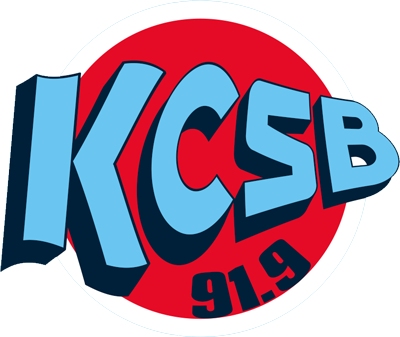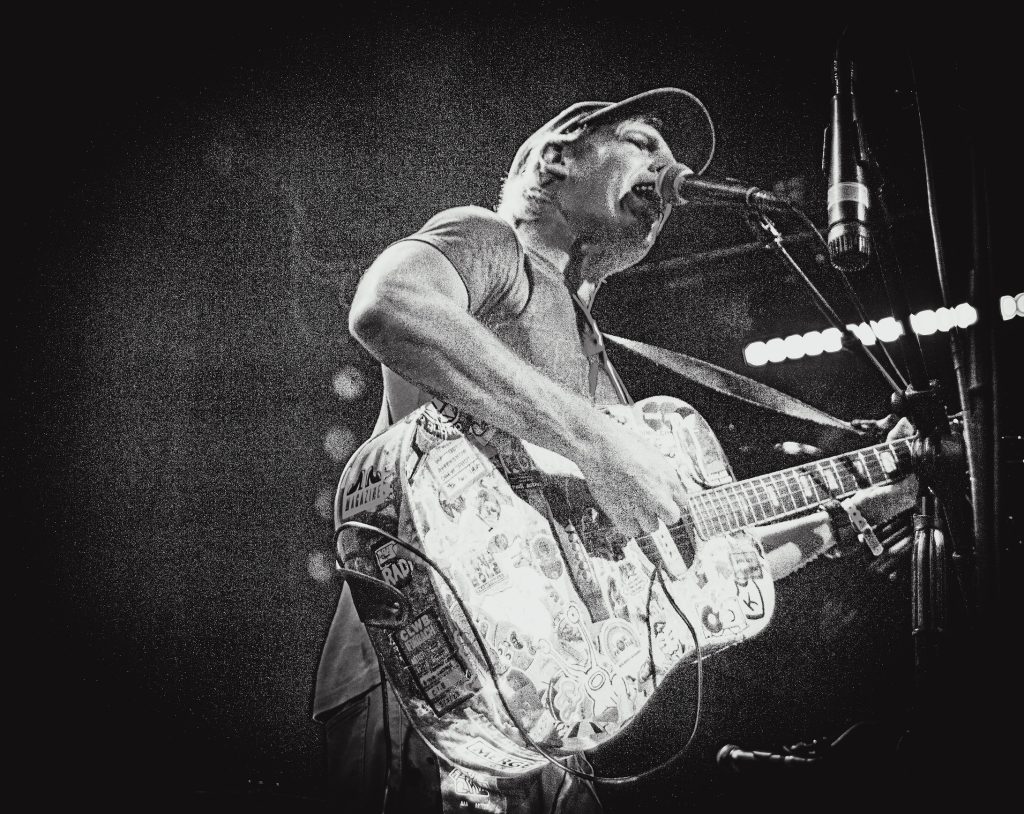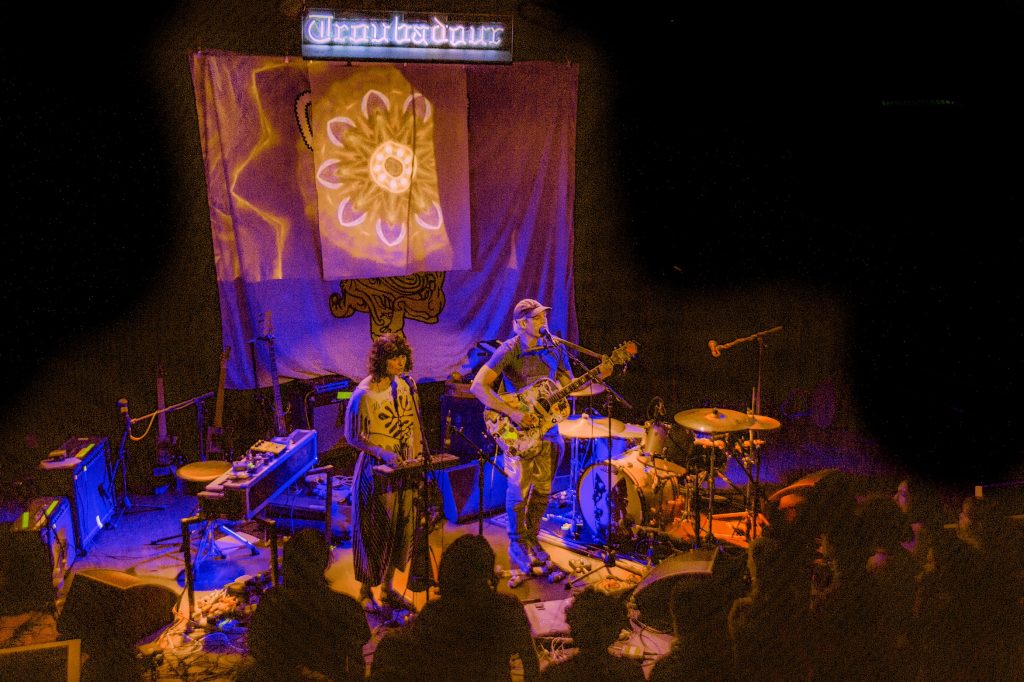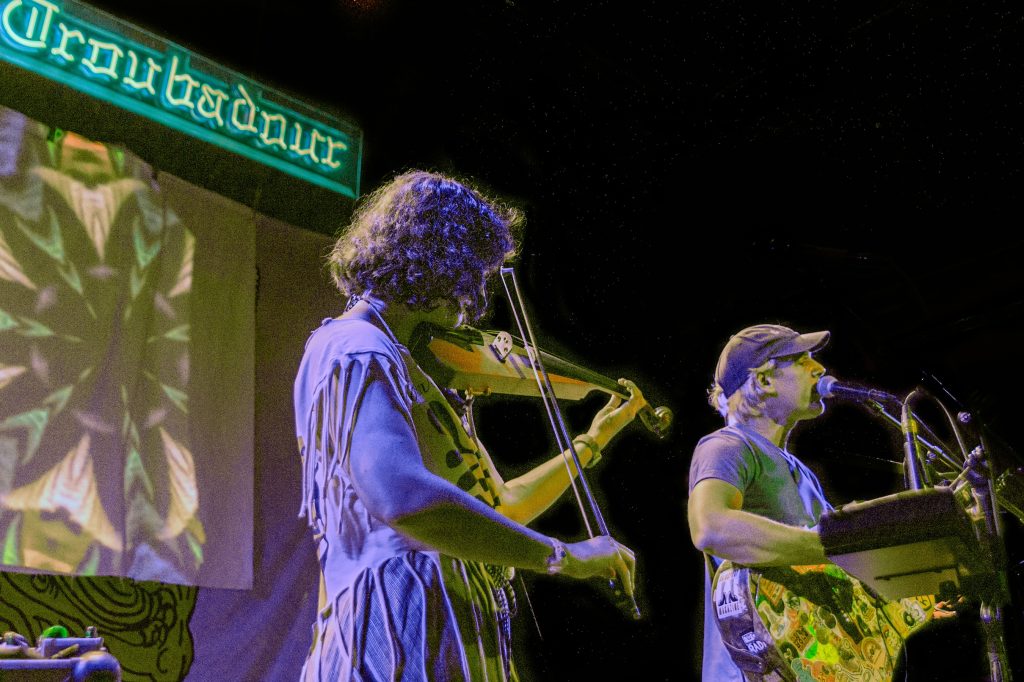An Interview with Jeffrey Lewis
KCSB-FM’s Digital Media Coordinator, Avery Morgan, sat down with Jeffrey Lewis after his set at the Troubadour to have a conversation about changes in DIY culture, his creative process, and inspirations.
Photos by Avery Morgan
Jeffrey Lewis is a musician and comic book artist, and when he performs live, he often combines the two by projecting drawings up on a backdrop and narrating along. He began his career in the 90’s and has an endless amount of zines and albums to show for it. I have been a huge fan of his since early high school, but I first saw him live at Java Station in Santa Barbara my freshman year. I was surprised to see him working to check tickets at the door. He offers free tickets in exchange for couches to sleep on while he’s on tour and wrangles up flyering teams through his email list to get the word out about his performances. After his performance at the Troubadour, I met up with him at the merch booth to chat.
Avery Morgan: To introduce myself, my name’s Avery. I’m with KCSB-FM in Santa Barbara. Do you mind introducing yourself, your pronouns, and where you’re from?
Jeffrey Lewis: Hello, my name is Jeffrey Lewis. He/him/his. I’m from New York City. But at the moment, I’m talking with Avery in Los Angeles.
AM: Awesome. So, you’ve been on tour with Quasi for a bit over a week now. What music or perhaps podcasts have you been listening to on those long drives?
JL: That’s a good question, Avery. Well, I’m a big fan of the band The Fall. The Fall is a little bit of a tough sell for other people who are not fans. It takes a while to get into them. It’s an acquired taste. So I’ve been trying to get Mallory, my bandmate, a little bit into The Fall by playing some early Fall records. So we listened to the first Fall album. And the second Fall album. And the third Fall album, recently.
And Mallory has been playing me some podcasts that she’s into. The Ram Dass Here and Now podcast, which is sort of philosophy… and psychedelic Buddhism. He was part of the 60s generation with Timothy Leary of people who did a lot of acid and then started getting into Eastern philosophy.
…Oh, and we listened to some Sleater-Kinney because of Janet from Quasi that we’re touring with [Janet was the drummer for Sleater-Kinney from 1996-2006 and 2014-2019]. Neither Mallory nor I had ever heard Sleater-Kinney before actually, although they’re quite a famous band. Then listening to Sleater-Kinney made me want to listen to Sonic Youth, because there was a certain Riot Grrrl kind of indie rock sound that reminded me of a bunch of Sonic Youth songs that I love, that I wanted to re-listen to. And Mallory is not that familiar with Sonic Youth. So, I put together a whole playlist of my favorite Sonic Youth songs, mostly 80’s stuff. Like you said, the drives have been long, so we listen to a lot of stuff, but that’s a good sampling.
AM: I’ve read other interviews where you talk about having a crazy amount of unfinished songs and artwork that never end up getting finished. So I’m curious how you approach making an album, if you tend to have a better experience trying to have some sort of collective theme or just having a time period where you put together whatever you finished? And if you have a preference for how people listen, just on shuffle or all the way through.
JL: I’m an all-the-way-through kind of listener, just because I’m of the generation that was buying records and thinking of a record as a listening experience. I just put it on a record and I would be drawing my comic books and listening to that full album, you know, flipping the side. If it was vinyl, flipping to the B-side. But, I find modern Spotify listening disappointing in the sense that I feel like it’s always playing me the same songs. It’s like it sort of knows what I would like, and there’s a collection of like 50 songs that it keeps playing. I’m like, there’s a lot of other stuff I would like to discover, and they have so much stuff on Spotify. I’m not sure why it gets so repetitive, at least in my experience.
But in terms of my own albums, it’s really cool and weird to see the streaming numbers, and to be living in this era of streaming numbers where I can literally just open up Spotify and see which songs are getting more streams than others. It seems to always be the case that the songs on the ends of the albums get much fewer streams than the songs at the beginning of the albums. I feel like everybody’s like, ‘Oh, let me check this album out.’ They listen to a couple of songs, then they go on to something else. So even if I think I’m putting the best songs last, nobody hears them. It’s this thing that I’ve noticed where I’m like, ‘Huh, there’s no point in putting the best songs at the end of a record nowadays because most people don’t listen all the way through to get there.’
The songs of mine that are getting the most streams when I see the statistics… I’m like, what, that doesn’t make any sense, why are people listening to those songs? I feel like my other songs are better. But what do I know, maybe people are right. If those are the ones that people like, then maybe those are my best songs. It’s very weird to see those sorts of numbers because when you’re just thinking of albums, if somebody buys one of my records and takes it home, I don’t know which of those songs they like better than the others, I just know they got the whole record.
And deciding what songs go on a record — I mean, I try to only put out the stuff I think is my best, obviously. But then, I don’t know. I mean, maybe my opinion of what’s my best isn’t correct because when I look at those streaming numbers, I’m like, those are not my best songs according to me. I’m completely ignorant and I try my best. But often when I try my best, I can still be just as wrong. So it’s weird… it’s weird when you think you’re right and you find out you’re wrong. It’s like a psychedelic experience, and it happens to me all the time. What can you do?
So yeah, my new album.. we have a new album! It hasn’t come out yet. We recorded it, and I think I picked the best songs for it and put them in the best order? But maybe I’m totally wrong. There were other songs I recorded that I thought, ‘Nah, I’m not gonna put this on the record,’ you know? But did I make the right decision? It’s just – I have been wrong… so many times I just don’t know.
…At this point, a pair of fans came up to Jeffrey to say hi and ask him what some of his favorite songs are. This became a group contemplation. Jeffrey said he finally came around and thinks it’s possible that Stairway to Heaven by Led Zeppelin is the greatest song ever made. Someone else says they’ve listened to every live version of Free Bird by Lynyrd Skynyrd and have a tier list of the best ones. All I could decide on was my current favorite song, Death Cab’s cover of Dream Scream by Daniel Johnston and rambled for a bit about Jeff Rosenstock being the greatest musician of all time…
AM: Okay, diving back in… My show on KCSB that I’ve been doing for a couple months now is called DIY Dive. So, I dive into do-it-yourself music and after I was doing that for like four weeks, I began to hate the word DIY. I like exploring nuances in culture, but I feel like I have a different grasp on the meaning of that word each week, you know, as times are changing. On the way down to LA today, I was listening to your song called Punk Is Dead that had me contemplating.
(Jeffrey pauses me to clarify that this song is a Crass cover and everyone should listen to the original Crass version)
AM: I’ve found that there’s kind of a weird cultural obsession with DIY right now. I’m not asking you to be the determiner of the definition of DIY, but I’m curious what changes you’ve seen throughout your years as a DIY musician? Do you have any stress of upholding a sort of idealized identity of being Do-It-Yourself, when it’s just the practices that you need to do to get your work out there?
JL: Okay, Avery. So, I think things have changed quite a lot in the sense that when I used to tour, I would come home with piles of stuff. Piles of stuff that people would give me at the gigs.
AM: CDs and stuff?
JL: Yes, CDs, zines, all sorts of physical media, and that has really gone out of style because here I am, I only have one gig left before the end of this tour, and on the whole tour, I’ve been given one CD and maybe one zine. And that’s maybe more than some other tours because I think nowadays people have the opportunity to just put stuff on Instagram and Bandcamp and whatever other, SoundCloud, Spotify, etc. But one thing with doing all of those methods of current modern digital distribution for whether it’s artwork or music: the fact that I just had to say a bunch of corporate names is problematic to me. If you just give me a zine or a CD, you’re really operating in a free open zone where anybody can just make anything, do anything, and pass it around and it’s not being monetized by some CEO. It’s not under some kind of format controlled by somebody else. Whereas nowadays, these things are accessible but they are also owned spaces. Or you have to say, “check out my Instagram, trademark, copyright, Instagram, blah, blah, blah, blah.. check out my SoundCloud, check out my Spotify, Apple Music, Bandcamp.” Everything is taking place in a corporate space. It’s a defined space that has parameters defined by that business and monetized by that business. Sending somebody else to my Bandcamp, or to my Instagram, to my TikTok, I’m advertising somebody else’s business in addition to my own work, whereas if I were to just give you my comic book or a record that I make myself, I don’t have to mention anybody’s freaking company name, I don’t have to send you to their companies, see their advertisements, be part of their algorithm, have them get your information in anyway or shape.
So the fact that there are these opportunities now is great, but it also is a little weird that there isn’t as much of a really autonomous zone of culture that’s completely like.. uh “DIY” to use that phrase. There’s something special about something that is genuinely just off the grid essentially. We’re in a weird cultural phase where that’s the current situation, not that it’s necessarily a bad thing because people are doing amazing, creative work, so people will continue to be creative and amazing regardless.
My own methods have always just been whatever works. I have an email list out here at my gigs where people are using a pen to write down their email address, and at the end of the tour, I have to go home and type it in, and I’m like, “What the hell does this say? Is that a J or an L or an I or a Q? Let me type it in four different ways and send an email to all four of them, and maybe one of them will reach this person.” It’s a very clunky and out-of-date way to keep in touch with fans, but I find it very effective, because if somebody wants to hear about my gigs or my comic books, that is a very direct way, and it doesn’t rely on, it’s not like making a TikTok post where maybe somebody will see it, maybe they won’t. Maybe TikTok gets banned by the government, and then it’s gone. Maybe it’s an Instagram post, and I have a certain number of Instagram followers, but when Instagram stops being popular, then all those followers are gone, and my email list is kind of like a direct connection between myself and the people that want to hear about my stuff.
And actually, before I had an email list, I literally had a physical mailing list where people would give me their mailing address, and I would mail them a comic book and mail them weird little things, but that just became way too cumbersome. I really couldn’t keep that up. At the point where I had like 35 fans in the entire world, that was starting to become kind of impossible to keep up with. So, yeah, these things, I don’t know… everything’s always changing…
A really huge influence on me was the book Our Band Could Be Your Life by Michael Azerrad. That book really taught me that it was possible to book your own tours, the way all these bands had done it. I think there should be an updated version of that, because I think, you know, people like Jeff Rosenstock or other people that are currently basically living that kind of life, myself included, things are different than they they were for Sonic Youth and the Butthole Surfers and Beat Happening, and the bands that are talked about in the book Our Band Could Be Your Life, they were making things work in the 80s in a certain way. And I think somebody should do a completely new version of that exact same book. And, like, how are bands touring and booking things? You know, I would like to read that book.
AM: Maybe a comic book version.
JL: Yeah.
If you want to learn more about Jeffrey Lewis, visit his Instagram page @jeffreylewisband. Rumors are that he’ll be touring again in the fall for his upcoming album, so keep an eye out…!



